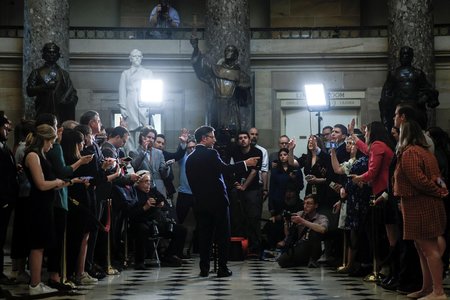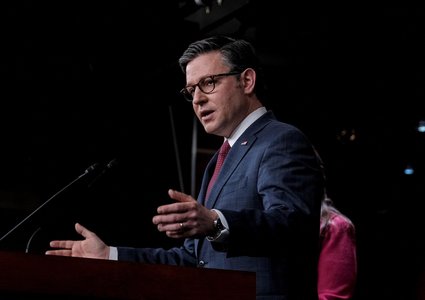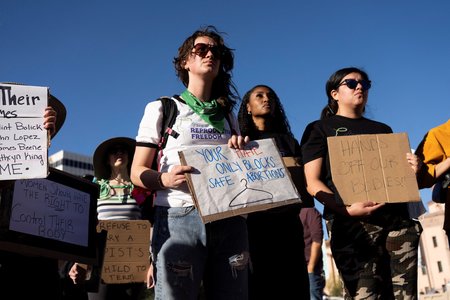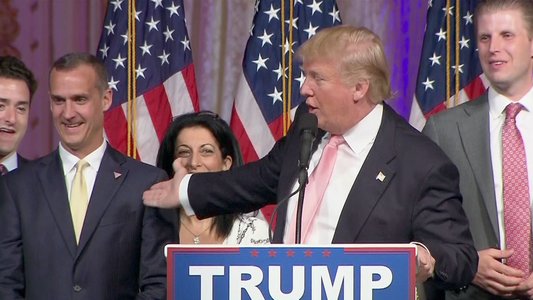Full Episode: Britain votes to leave the European Union, the Supreme Court releases decisions & Congress debates gun control
Jun. 24, 2016 AT 4:59 p.m. EDT
TRANSCRIPT
Notice: Transcripts are machine and human generated and lightly edited for accuracy. They may contain errors.
GWEN IFILL: Living on the edge – in Europe, at the Supreme Court, on the campaign trail and in the halls of Congress. We cover surprise after surprise tonight on Washington Week .
U.K. PRIME MINISTER DAVID CAMERON: (From video.) I do not think it would be right for me to try to be the captain that steers our country to its next destination.
MS. IFILL: In a shocking turn, Britain votes to leave the European Union, sending ripples through international finance and politics.
DONALD TRUMP: (From video.) What happened should have happened, and I think they’ll end up being stronger for it.
MS. IFILL: In the U.S., a Supreme Court tie revokes a key Obama administration immigration reform that would have offered protection to millions of the undocumented.
PRESIDENT BARACK OBAMA: (From video.) Leaving the broken system the way it is, that’s – that’s not a solution. In fact, that’s the real amnesty.
MS. IFILL: But civil rights advocates win another Court decision, on affirmative action.
On the campaign trail, it’s cash talk and trash talk.
MR. TRUMP: (From video.) Hillary Clinton may be the most corrupt person ever to seek the presidency of the United States.
FORMER SECRETARY OF STATE HILLARY CLINTON: (From video.) He’s going after me personally because he has no answers on the substance. (Cheers, applause.)
MS. IFILL: As Clinton outraises Trump by millions. In Congress, House Democrats throw down the gauntlet on guns.
REPRESENTATIVE JOHN LEWIS (D-GA): (From video.) I would ask that all of my colleagues join me on the floor.
MS. IFILL: Civil disobedience comes to the House of Representatives.
HOUSE SPEAKER PAUL RYAN (R-WI): (From video.) We are not going to allow stunts like this to stop us from carrying out the people’s business.
MS. IFILL: Covering the week, Naftali Bendavid, Washington editor for The Wall Street Journal ; Joan Biskupic, legal affairs editor for Reuters; Jonathan Martin, national political correspondent for The New York Times ; and Ed O’Keefe, political reporter for The Washington Post .
ANNOUNCER: Award-winning reporting and analysis. Covering history as it happens. From our nation’s capital, this is Washington Week with Gwen Ifill . Once again, from Washington, moderator Gwen Ifill.
MS. IFILL: Good evening. We’re going to do our best tonight to make sense of a week that intertwined foreign policy, financial policy, 2016 politics, domestic civil rights and guns – yes, all of that, just this week.
First, to Britain and Brexit, the markets and the potential for new leadership here and abroad.
PRIME MIN. CAMERON: (From video.) There are times when it is right to ask the people themselves, and that is what we have done. The British people have voted to leave the European Union, and their will must be respected.
MS. IFILL: Naftali is recently back from a tour covering the European Union in Brussels, and he’s probably best positioned to explain how this came about and why. So have at it, Naftali.
NAFTALI BENDAVID: Well, one of the great twists of this whole thing is that it was David Cameron’s idea, and so watching him stand up and announce his resignation, he was – you just got the sense that he was the author of his own downfall, in sort of a poignant way.
MS. IFILL: It was his idea to create this face-off.
MR. BENDAVID: To create a referendum, because he was facing enormous pressure from the right of his own party and from the United Kingdom Independence Party, UKIP, which has been a real force against the EU, and he felt like he had to do something. So his idea was, if I get re-elected, I’ll hold a referendum, I’ll put this in front of the British people, and he thought there’d be a resounding vote to stay, and that would put the problem behind him.
Of course he, like many other people, completely miscalculated, and that brought about the result that we’re seeing now.
MS. IFILL: Why did he have to quit, though? People lose all the time here and don’t quit.
MR. BENDAVID: Well –
MS. IFILL: How many names can I name here? (Laughter.)
MR. BENDAVID: Well, I think partly it’s the difference between a parliamentary system and the system that we have. I mean, if he was out there in an impassioned and emotional way, really, particularly in recent days, making the case for staying in the European Union; he had gone to Brussels and renegotiated Britain’s relationship with the EU, came back and said, OK, now we’ve got to stay in; our country’s future depends on it; it’s vital, it’s crucial – when you lose a vote like that, you don’t have a lot of choice.
JOAN BISKUPIC: He was so emotional. Who would be next? Who’s in line?
MR. BENDAVID: Well, the betting is on a guy named Boris Johnson, this former mayor of London, who’s sort of a flamboyant character.
MS. IFILL: Sort of.
MR. : Sort of? (Laughter.)
MR. BENDAVID: He’s out there a lot. He’s made the case very strongly for leaving. And so in a way there’s a sort of – you know, you own it now. And he’s the guy who fought particularly hard and particularly in a high-profile way to make this happen, and so now it’s going to be his responsibility to negotiate the separation in a way that’s good for his country and good for the EU.
ED O’KEEFE: You know, we can blame pollsters, as they often get blamed, but why did remain, as it was called, lose?
MR. BENDAVID: Well, I think the –
MR. O’KEEFE: And we can blame pollsters because it looked like they were going to win. That’s what I want to clarify.
MS. IFILL: Well, and a lot of young people – the younger people, according to these polls, were in favor of remaining.
JONATHAN MARTIN: Yeah.
MR. BENDAVID: I mean, I think the fundamental miscalculation maybe was the importance of the immigration issue, and the great failing maybe of the remain camp was to let this turn from a referendum on the pluses and minuses of the EU to a referendum on, well, how do you feel about all this immigration we’re getting? And that was a vote they were going to lose. They lost resoundingly, and the – you know, the pro-leave camp just used that relentlessly, and it was something that ultimately couldn’t be overcome.
MS. IFILL: How did – I’m actually curious about how the U.S. and Britain relations – relationships ultimately will be affected, because we know – we’ve been all watching what happened with the stock market today, but we know it’s about more than just that.
MR. BENDAVID: Oh, it is. I mean, I think the European Union, for leaders in Europe, is really about history, and it’s about culture and politics. It’s the idea that after centuries of bloodshed, culminating in World War II, this greater – ever greater integration and union was going to be the solution, this sort of “never again” response. So this is really something of a trauma.
And in terms of the relation with the U.S., I mean, you know, Obama today was talking about the special relationship: It’ll endure. It won’t change.
But you know, the U.S. counted on the EU to be a sort of pro-U.S. force within Europe, and now they’ve just lost that. And so I think what we’re going to see is an attempt, for example, to strengthen NATO and other organizations where the U.S., the Europeans and the British are all together.
MR. O’KEEFE: And can I ask you about Scotland?
MR. BENDAVID: Yeah. So Scotland –
MR. O’KEEFE: They may break off again or they’re thinking about it –
JONATHAN MARTIN: They’ve tried it in Ireland too, for that matter, right?
MR. BENDAVID: That’s right. I mean, talk about referenda. So not that long ago there was a referendum in Scotland about leaving the U.K. – Scexit, I guess you could call it – (laughter) – and so that one barely – there was a vote to stay in. But you know, Scotland’s much more pro-EU, much more left-leaning than the rest of the United Kingdom, and I think you can almost say it’s likely that now we’ll see a move for another referendum for Scotland to leave the U.K., and I think it would have a better chance of passage. It’s just one more sign of the unintended consequences.
And similarly, you know, with Ireland, there’s going to be a push, probably, for sort of a reunification of Ireland, which means Northern Ireland would leave the United Kingdom. I mean, these things have these tremendous ripple effects that I don’t think were foreseen by everyone.
MR. MARTIN: And how serious do you take the movement on the continent among some of the far-right parties to bring up referenda in their own countries? For example, Holland and France – you’ve already seen moves now from, you know, leaders there on the far right.
MS. IFILL: Marine Le Pen in France.
MR. MARTIN: Yeah.
MR. BENDAVID: I mean, there’s no question, I think, that this is going to energize those forces, but I do think that the United Kingdom was in slightly of an unusual, almost unique position. They were not actually as fully integrated into the EU as some other countries.
MR. MARTIN: It’s an island nation, yeah.
MR. BENDAVID: It’s an island nation. They always saw themselves as being sort of halfway between Europe and the U.S., if you will. But you know, they didn’t adopt the euro.
MR. MARTIN: Yeah.
MR. BENDAVID: I mean, maybe not everybody knows that, but not every country in the European Union passed the common currency, the euro. They weren’t part of the free travel arrangement that the other European countries have. So there’s a sense in which it was easier for them to extract themselves. I mean, France is a euro country. Holland is a euro country. There will certainly be a push for it, but I think it’s going to be tougher for them to leave than it’s going to be for England.
MS. IFILL: It’s going to be – continue to unfold. It’s so interesting.
But perhaps as consequential on this side of the pond, the U.S. Supreme Court decided this week to strike down an Obama-directed immigration reform provision and to uphold a Texas affirmative action plan. Of the two, which surprised you most? I – Joan, I know I was more – well, I won’t say. (Laughter.) What surprised you most?
MS. BISKUPIC: I have to say the affirmative action decision was the most surprising.
MS. IFILL: OK. We agree.
MS. BISKUPIC: OK. (Laughter.)
Well, first of all, I should tell you that that was one case where we knew they weren’t going to deadlock, because seven justices had heard that case. Of course Justice Antonin Scalia had passed away in February, but Elena Kagan was also out of that case because she had worked on it was when she was in the Obama administration as solicitor general.
But here’s what happened. You got a decision, 4 to 3, that was a very strong endorsement of race-conscious admissions on college campuses. And that’s something that, sure, the court had done before, but it had looked like in recent years that the court was going to go in an opposite direction. Four years ago, when the justices first took up this case, brought by a white young woman by the name of Abigail Fisher, it was sort of a surprising move. She had been rejected in 2008 from the University of Texas flagship campus in Austin. She had already gone to another school. She was close to graduating. It looked like the case should be over. The Texas affirmative action policy is fairly distinct. But the justices still reached out to take it, and we think – you know, because conservative interest to maybe roll back the policy – and then in 2013 earlier ruling on this, they punted back to a lower court but suggested that these programs need more scrutiny. Then she lost in the lower court. She came back again, and the justices said, we’re going to hear your challenge again. So it looked like they were headed in a certain direction and then reversed course, all because of Anthony Kennedy.
MR. O'KEEFE: That immigration case, though, probably has a more real-world impact on a lot of people in this country. And I’m just curious – it was 4-4, which means, as I was –
MS. IFILL: We’re talking millions and billions – millions and millions of people.
MR. O'KEEFE: Yeah, tens of millions of people –
MS. BISKUPIC: Right now.
MR. O'KEEFE: – or their children. And you know, 4-4, technically not a decision, right?
MS. BISKUPIC: Well, it was a decision, but not a national precedent, because they had no ruling. They left in place the lower court decision that was against President Obama, that had blocked his plan that – you’re right – would affect more than 4 million immigrants who are here illegally now, and he had wanted to give them – you know, shield them from deportation but also give them work permits. So that is a really big deal, with so few months left in his administration.
MR. O'KEEFE: But what is the practical effect? I mean, presumably we’re not going to turn around and deport 4 million people right now.
MS. BISKUPIC: No.
MR. O'KEEFE: So what is the actual practical impact of the decision?
MS. BISKUPIC: Right. It’s the work permits. You know, they can’t be free to work now. And it really sends a signal to a lot of people who’ve been in the shadows.
MS. IFILL: Isn’t there also a practical impact on the president’s power to make change by executive action? Isn’t what the court – isn’t that what the court was really rejecting?
MS. BISKUPIC: Well, if the – well, first of all, the lower court was really rejecting, yes –
MS. IFILL: Right, the appellate ruling court.
MS. BISKUPIC: – the lower court had said that his – that his executive action here had violated, you know, an administrative law.
MS. IFILL: Right.
MS. BISKUPIC: And – but you know, this was a case that was actually designed by Republican-governed states – 26 states had come forward, had found a judge in Texas that sort of would think along those lines. So it didn’t give any kind of definitive idea about the scope of executive power, but the lower courts – you’re right, Gwen – certainly were for a narrower view.
MR. MARTIN: And what does – these two cases tell us about the polarization of the court, the increasingly almost political nature of the court?
MS. BISKUPIC: Well, you know, it’s short-handed, and of course, you know, a lot of the politicians were saying that we wouldn’t have had this deadlock if somebody had gotten on. But you know, Merrick Garland was not going to get on that quickly. That’s for sure.
MR. MARTIN: Sure.
MS. BISKUPIC: And this time of year, in June, we always look forward to 5-4 decisions. Now we’re looking forward to 4-4 and 4-3 decisions.
MS. IFILL: How applicable are these cases to anything beyond – for instance, affirmative action – we know it spoke to the University of Texas affirmative action program –
MS. BISKUPIC: Yeah.
MS. IFILL: – a very specific way of addressing that issue. Does it apply to anybody else or any other university?
MS. BISKUPIC: It doesn’t, but it certainly signals that this court, with these justices, especially Anthony Kennedy, who did a little bit of a switch here, a little pivot from where he had been before – I should just take a take detour to say this was the first time he had upheld a race-conscious campus affirmative action program. And that signal is loud and clear to places like Harvard and University of North Carolina that have been sued by the same conservative advocates, in this case saying, this court really isn’t ready for business to roll back affirmative action right now.
MS. IFILL: Well, maybe we can’t specifically say that was about politics, but as we know, everything else is – (laughter) – whether it’s Donald Trump taking credit for the Brexit outcome while he was standing on one of his golf course properties in Scotland or running mate debates or cash on hand or tit-for-tat policy speeches.
MRS. CLINTON: (From video.) We cannot put a person like this, with all his empty promises, in a position of power over our lives. We can’t let him bankrupt America like we are one of his failed casinos.
MR. TRUMP: (From video.) She’s always misread everything. (Laughter.) I mean, no, if you think – she’s misread this, and I was surprised that – that she was so bold and to say what – the only reason she did it is because Obama wanted it. You know, if Obama wanted the other way, if he said leave, she would have said leave.
MS. IFILL: Trump was of course referring to how the president and Clinton ended up on the losing side of the Brexit debate by supporting their ally David Cameron. But when it came to money, staffing and polling, it’s not like it was a good week for Donald Trump, was it, Jon?
MR. MARTIN: No. I mean, this is – every week it’s just – it’s stunning to see what’s happening in this campaign –
MS. IFILL: Yeah.
MR. MARTIN: – where you’ve got a major party nominee with as much money in the bank as most House candidates. It just does not happen. And it’s a –
MS. IFILL: You’re talking about 1.3 million (dollars) cash in hand in May –
MR. MARTIN: Right.
MS. IFILL: – as opposed to her 42 million (dollars) cash on hand.
MR. MARTIN: A 42-to-1 deficit.
MS. IFILL: Yeah.
MR. MARTIN: It’s the canyon-sized –
MS. IFILL: Yeah.
MR. MARTIN: It does tell us just how different this campaign is from more conventional, you know, campaigns, as well as watching him there on the cliffs of Scotland, talking about his golf property.
MS. BISKUPIC: At length.
MR. MARTIN: Yeah, exactly, and at length.
So you know, this is different, but he’s still competitive. I mean, it is so fascinating to me, Gwen, that he’s got far less money, he’s got no real campaign structure at all, he says things on a daily basis that would disqualify most other candidates, and he’s still competitive in the race. And that tells us how polarized this country is. Donald Trump may find the floor yet – be sure, there is a floor – and you know, the fact is, is that if you look at state level, he’s still competitive in some of these battleground states in this country. So look, there’s no question that she has an advantage at – right now, but it’s still stunningly competitive, given his deficits on money, on staff and on message.
MR. BENDAVID: Jon, what do you think of the down-ballot races? I mean, this is something that comes up a lot. You know, one of – the question’s not only will he win –
MR. MARTIN: Yeah.
MR. BENDAVID: – but of course the Democrats hope to retake the Senate. They feel like they have an outside shot at taking the House. I mean, how real is that? How much of a concern is that to Republicans?
MR. MARTIN: Well, elections in this country are increasingly, you know, parliamentary. I mean, you don’t see the kind of ticket-splitting that you saw, you know, 40 years ago in America. And so if you’re a Republican on Capitol Hill or in a statehouse, that makes you concerned, because your fate is tied to Donald Trump.
Now they will say till the cows come home, well, he’s running his race; I’m running mine. But as you know from covering this stuff, that’s not always how it is. And if there is a significant downdraft, that is going to hurt them, and I think that’s why you’re seeing separation between these candidates and him. I’m just not sure it matters if it’s that bad of a wipeout for them this fall.
MS. BISKUPIC: Let me ask you about the effect of a ruling like the immigration one yesterday –
MR. MARTIN: Yes.
MS. BISKUPIC: – on Donald Trump. Will there be – do you think there will be enough a backlash to bring more Hispanics to the polls?
MR. MARTIN: Yeah –
MS. BISKUPIC: I mean, because that’s – this is exactly where he’s been living, on the immigration issue.
MR. MARTIN: Absolutely. And it cuts both ways. It was a hugely helpful force for him in the primary, which is dominated by white individuals, white voters in America. This is the challenge for the Republicans. They have two different universes. They have a primary electorate that’s almost all white and a country that is increasingly diverse. And trying to –
MS. IFILL: When he talks about what great success he has had, he’s almost always talking about that primary audience.
MR. MARTIN: Absolutely. And it’s different deal to scale up from, you know, a fraction of the country, which is the primary, to the entire country in the general. And that’s where, you know, the Hispanic vote comes into play – a total nonfactor during the primary. And it’s going to be crucial in places like Arizona, like Nevada, Colorado and, most importantly, in Florida. If Donald Trump can’t carry Florida, everything gets harder for him.
MR. BENDAVID: But the – go ahead.
MR. O'KEEFE: Real quick, can he close that 42-to-1 money gap, do you think?
MR. MARTIN: I think he can, and I think he will close it from 42 to 10 or so. (Chuckles.) I mean –
MS. IFILL: But we’re suggesting here on some level that Hillary’s just sitting – Hillary Clinton is just sitting back and hoping that he falls on his own weakness.
MR. MARTIN: Well, and that’s the other point too, is that she and President Obama and the Democratic Party will hammer Donald Trump on issues related to Hispanic voters; on, you know, issues related to women, African-Americans, you name it. And so, you know, they’re going to go after him very, very aggressively. And so far, you know, it’s like he’s throwing rocks at, you know, airplanes. I mean, it’s just – it’s so ineffective right now, what he has in his arsenal. Again, primary versus general – you can win a primary, I guess, these days on a Twitter account and a constant cable news presence.
MS. IFILL: You know, I wouldn’t rule it out, even though I cannot wait to get to that election and find it – that convention and find out.
MR. MARTIN: It’s different in – it’s different in the general election.
MS. IFILL: Exactly. Well, we’ll see.
And we saw a remarkable demonstration on the House floor this week, inspired by 1960s activism and powered by current-day social media, as Democrats stopped action on the House floor by simply sitting down. The plan was to get a vote on gun control, which did not happen, but a debate did.
REP. LEWIS: (From video.) We have lost hundreds and thousands of innocent people to gun violence: tiny little children, babies, students and teachers, mothers and fathers, sisters and brothers, daughters and sons, friends and neighbors. And what has this body done? Mr. Speaker, nothing.
SPEAKER RYAN: (From video.) Democrats were not interested in advancing the process. They’re interested in stopping the process.
MS. IFILL: Well, Ryan kind of had a point, and in that they succeeded. But that doesn’t mean that the Democrats didn’t – came – do what they came to do, does it, Ed?
MR. O'KEEFE: Well, they didn’t get a vote. They don’t have an assurance that when the House reconvenes on July 5 th that there will be a vote. And Ryan was correct in pointing out that while this was going on, the Democratic Congressional Campaign Committee, which is responsible for electing Democrats to the House, was sending out fundraising appeals reminding potential donors that they were doing this. So, you know –
MS. IFILL: It makes you question: What was the point?
MR. O'KEEFE: Well, I think there’s a genuine frustration among many of these Democratic lawmakers that despite their best efforts, they have not been able to do what they did here: dominate the conversation and get a real conversation going about guns. Chris Murphy, the senator from Connecticut, did it last week in the Senate. John Lewis and friends did it this week in the House. It is notable that in both cases this was rank-and-file lawmakers who come from areas of the country where gun violence, where mass shootings are prevalent. They kept the leadership out of it and they went to the floor and they did something.
MS. IFILL: And their leadership allowed it.
MR. O'KEEFE: And they forced their party to come along with them and get the attention that they did.
MS. IFILL: No Pelosi, no Reid involved in any of this.
MR. O'KEEFE: Not in the initial parts, but you better believe they jumped on it as quick as it started.
MS. IFILL: (Chuckles.)
MS. BISKUPIC: Well, this has been asked: Then how did it come about? Because you had John Lewis, who – you know, the civil rights icon, recalls Selma. So who was his partner to get him to the floor like that?
MR. O'KEEFE: So several different rank-and-file members had sort of dreamt this up earlier in the week, and they went to Lewis and said, would you join us in this? And they kept it secret from party leaders in their Wednesday morning meeting, but then during the meeting somehow word somehow got out to Pelosi, and she said, well, OK, if you’re going to do it, let’s see what happens. And you know, it proceeded.
What I was told – and I think it’s true – is that what they didn’t anticipate was how quickly this would sort of mushroom through social media, the fact that they had to rely on Periscope and Facebook video to get the word out, and how quickly that sort of viral – literal viral look of it –
MS. BISKUPIC: If C-SPAN hadn’t cut the – if the House – the majority hadn’t cut it –
MS. IFILL: I think it was the House that cut the feeds.
MR. O'KEEFE: Yeah.
MS. BISKUPIC: – cut the feed, would it have gotten as much attention, I wonder. Yeah.
MR. O'KEEFE: No, and I think what happened is, initially they couldn’t show it and that word got down to the floor, and so they took out their phones and started streaming it.
MS. BISKUPIC: Yeah.
MR. MARTIN: And the chant was, no vote, no break. Well, there wasn’t a vote, and there is a break.
MR. O'KEEFE: Right.
MR. MARTIN: In this era of short attention spans – we’re on to Brexit, obviously, now – is there any evidence that this was effective for them in the long term, i.e., this November?
MR. O'KEEFE: They do believe it will be. They showed me a list of House races across the country – in New York and Florida, even Iowa, Kansas and Colorado, which are more rural places – where they think now they can run on this issue against a Republican opponent and make the case that Congress overall isn’t doing a lot, but they’re especially not addressing this issue.
In the Senate races, they believe that in Ohio, in New Hampshire, in Florida and a little bit in Pennsylvania, because Pat Toomey, the incumbent, has actually been pretty active on this – they can make the point as well.
MR. MARTIN: Yeah.
MR. O'KEEFE: You have not seen that from Democrats probably since the ’90s, since the assault weapons ban was passed back in ’94.
MR. BENDAVID: Yeah. Well, that’s what I wanted to ask, is how much of a climate change we’re seeing, in the sense that they’re willing to filibuster and have sit-ins, where a few years ago they seemed to run from the issue.
MR. O'KEEFE: So they’re looking at polling that says that on issues like banning terrorist suspects from getting guns or expanding background checks, the public’s with them. Because of that, they’re going to continue talking about it
MS. IFILL: And we’re assuming it on the Senate side, with the Collins compromise, which also is still stuck, maybe something will move, this will force it to move?
MR. O'KEEFE: Absolutely.
MS. IFILL: OK. Well, we did it! We got most of it in. (Laughter.) But we could barely squeeze in everything. So be sure to check out our Washington Week Webcast Extra online, where we’ll also be able to talk Marco Rubio’s political return and what’s up next in the Supreme Court’s final decision week. That’s later tonight and all weekend long at PBS.org/WashingtonWeek. Keep up with daily developments every night with Judy Woodruff and me on the PBS NewsHour . And we’ll see you next week around the table on Washington Week . Good night.
MOST POPULAR


Full Episode: Washington Week with The Atlantic full episode, 4/19/24


Clip: Will Democrats rescue Johnson's speakership to protect aid for Ukraine and Israel?


Clip: Attacks in Israel and Iran bring more uncertainty to Middle East

Preview: Coming Up on Washington Week with The Atlantic


Full Episode: Washington Week with The Atlantic full episode, 4/12/24

© 1996 - 2024 WETA. All Rights Reserved.
PBS is a 501(c)(3) not-for-profit organization


